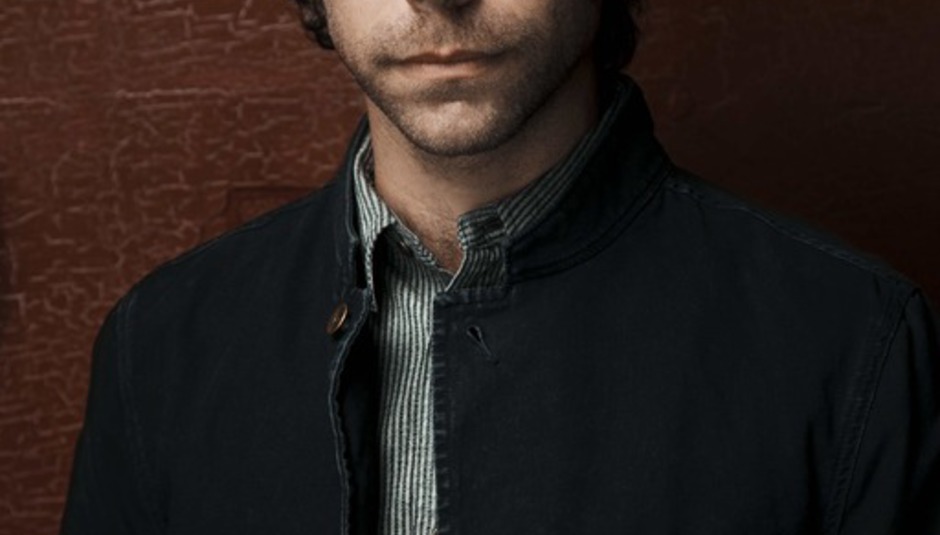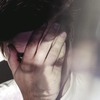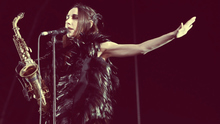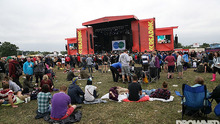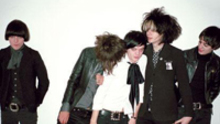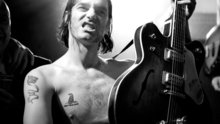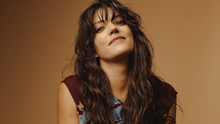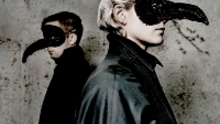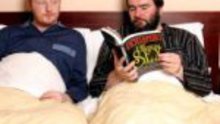Better known as one of the guitarists, songwriters and occasional producer with The National, Bryce Dessner's work doesn't just end with the heavily feted Brooklyn quintet. Alongside twin brother Aaron and London-born visual artist Matthew Ritchie, Dessner is also a formative member of The Long Count project. Initially commissioned for the Brooklyn Academy of Music's Next Wave Festival, the three of them created a piece of work based on 'Popol Vuh', which tells the story of how Mayan culture was created. Featuring a host of collaborators ranging from the Deal twins Kelley and Kim, fellow National band member Matt Berninger, My Brightest Diamond's Shara Worden and recent addition Tunde Adebimpe of TV On The Radio to a twelve-piece orchestra, The Long Count is a complex and fascinating piece of work that only serves to highlight the multi-faceted talents of its creators.
This week from Thursday 2nd until Saturday 4th February, Bryce and co. bring the project to London's Barbican Centre, promising a unique performance unlike those previously aired at the Next Wave Festival in 2009 and the Holland Festival two years later. In a rare interview, Dessner spoke to DiS about the origins of The Long Count, the song writing and visual arrangement process, and of course future plans for his more familiar role with The National.
DiS: The Long Count's first ever UK performances take place this week. Are you excited about bringing the show to England? What can UK audiences expect?
Bryce Dessner: We're really excited. It's something we don't get to do very often. We've been talking to the Barbican about bringing the show over here for a while, but being so busy touring with The National has made it difficult to find the time. It's a pretty crazy show. There's fourteen musicians on stage, and three different singers, then there's this big set with a mirrored floor and a seventy minute film. It's basically one straight shot. Musically, it veers between classical - for instance we have a string quartet - towards a similar kind of thing to what we'd be doing with The National. Some areas have a harder edge, like punk or perhaps even a math rock side to it, so musically it's really broad. It's a pretty dynamic show and it moves really quickly, which is fun for us because it's a very different experience to what we're used to doing.
DiS: Was it difficult to orchestrate and arrange the music in time with the visuals? Which parts of the concept came first for instance, the music or the visuals?
BD: It all came about simultaneously. We did a bunch of workshops and smaller performances with single parts of the music. We worked on it for quite a long time and recorded demos as each piece came together in the same way we would with our band. All of the people who've contributed to The Long Count were just great to collaborate with. I'd give them a song and they'd go away and do something with it. The same with my brother. We'd be passing ideas back and forth. Aaron would write something and I'd arrange it, or I'd write something and he'd arrange it. The whole process was very open in the most organic fashion. Then we had a similar way of working with the various singers who've collaborated on it. In total it took about a year to get to the stage where we could put on a show.
DiS: I believe you were first approached by the Brooklyn Academy of Music three years ago? What made you choose this channel of musical expression and in particular, Popol Vuh?
BD: I think I was asked originally because of my background in contemporary music. I've done smaller projects with smaller ensembles so to take this into an opera house kind of setting was something I always wanted to do. Even though we're used to playing in big venues with The National it was still a pretty tall order to come up with something on this scale. Me and my brother had been putting together some music that had started to develop more ambitiously. We'd been playing around for three years, trying out techniques such as hocketing guitars - changing the notes sequentially - so the music itself was introduced very much in that idiom. And then Matthew Ritchie was someone whose visual arts I'd been a fan of for a long time. I've collaborated with him a few times on large projects. There's another project of his called 'The Morning Line' which is worth checking out. I wrote the music and directed the piece for that. He tends to go for the big productions whereas we're normally used to working on a much smaller scale. He's just so focused and able to think on a large scale, particularly in terms of the conceptual and narrative themes. The story of 'Popol Vuh' came from him. He'd been adapting the texts from that story which is really fascinating for many reasons, especially with two of the main characters being twins like myself and Aaron. I had written this piece before that called 'Chulo' which is based on French guitar music and about being twins; kind of playing on being mirror images of each other. I think people responded to that. We gave them something personal to try and relate to in what they were watching, and it gave us the idea that maybe we could go on to make something bigger, and that's one of the main reasons how the idea for this came about.
DiS: It's interesting you mention the Hero Twins, Hunahpu and Xbalanque. Do you feel any kind of kinship with these characters or even relate to them in any way? Maybe even viewing yourself or Aaron as the mirror image of either as you spoke about earlier?
BD: It's quite an ancient story so for that reason very difficult to relate on that kind of personal level. What is most interesting about it is the way Matthew has structured these images of two twins in the countryside playing a ball game. The story itself has been told in a way that sort of shows how they become part of this world via a series of insane tests where they die and are reborn many times. That tension between light and dark I think is what draws people into the story, and the music we wrote kind of fits in with the whole visual concept. I mean, it's not an opera and it's not a play and it's not a musical; it's really just a set of songs with a film and musicians on stage. It doesn't retell the story of 'Popol Vuh'. The songs have been woven out of that narrative so all the lyrics relate to what's in the text. Together, the songs and the film abstractly tell the story but I guess it can be hard to follow. We redid it several times to try and give it a modern slant, but the story of 'Popol Vuh' has never really been told in a linear or modern fashion before.
DiS: You mention the tests being an integral part of the story, and one of the performance videos which has been uploaded onto the internet is a piece of music called 'Tests' along with another entitled 'Breakaway'. Are there any plans to record the project either as an album or film in the foreseeable future or even make the songss publicly available in any way?
BD: I think we will eventually release it as an album. It's quite an ambitious project and there's a whole lot of music to record, and in between doing The Long Count we've been busy touring with The National. We've just recently added two more songs to the performance. The version we're going to be doing in London is different from all of the others we've done previously. One of the new songs we wrote with Tunde (Adebimpe) from TV On The Radio. He's like a new character in the piece and it's terribly exciting for him to be involved in that way.
DiS: There are several collaborations within The Long Count project. Obviously Tunde who you've just mentioned, Kim and Kelley Deal, Matt Berninger and My Brightest Diamond's Shara Worden. How did they become involved with the project and to what extent do they contribute in terms of writing and arranging?
BD: Well, for a start, Kim won't be appearing with us at the London shows. She's currently busy with Pixies. What will happen now is that Kelley will sing both hers and Kim's parts. It's really compelling to see as she's quite an interesting and exciting singer. All of the music was written by Aaron and I, and then the parts which other people contribute was mainly in the form of lyrics, Kim and Kelley for example. Shara Worden wrote a piece of music that is like an exact setting for what's in the text. Shara is one of our primary collaborators. She kind of embodies what the project is about in these two different worlds; she's trained as an opera singer but sings rock songs. She loves playing different characters and her music is all about that, and I guess you could say that her roles in the piece make her the star of the show in many ways. Getting Kim and Kelley Deal involved was like a big moment for me. Thinking about the sound of their music and how the show could incorporate a side of that. I mean, they never quite pushed their music as far as someone like Sonic Youth did for example, yet it's just as infectious, and then the fact they're also twins was a key factor, and the fact we're all from the same part of the world. I wrote to them about the story and they immediately thought it would be fun to get involved. Obviously Matt (Berninger) sang on the previous version, and he had really hoped to get involved at that time, writing a song that was totally different from what we do with The National...
DiS: Is Matt Berninger over for the shows in London?
BD: He won't be there. Tunde is playing his role.
DiS: The first piece you and Aaron wrote together which kind of preempted The Long Count was 'Big Red Machine' for the Dark Was The Night compilation. How did that come about?
BD: 'Big Red Machine' was more my brother and Justin Vernon from Bon Iver. The music for that was like the demo for The Long Count in that it was quite ambitious in the way we approached chord changes so there was a pulse and a rhythm. That was the moment when we both realised what type of music we wanted to make with The Long Count. It was really quite exciting trying to explore a sound you're eventually going to throw yourself into and then Justin wrote that song which is just so beautiful and 'Big Red Machine' was actually our working title before we came up with The Long Count. 'Big Red Machine' is the name that was given to the Cincinnati Reds, who were the 1976 World Baseball Series champions. As kids, it was how me and Aaron really related. It was the year of our birth so Justin interpreted that; he knew what that meant and took 'Big Red Machine' to mean a big beating heart. It is kind of our song, and originally we were going to use it as part of the show and then it came about that the whole performance element was going in a completely different direction and it wouldn't necessarily work as part of it, but that dates back to the same period of time when we started writing in this way.
DiS: What do you see as being the long term plans for The Long Count, and do you see yourselves working with Matthew Ritchie in your day job as part of The National?
BD: Matthew likes to work with pieces that are about themselves. You know, The Long Count is a piece and we're all playing in it, as opposed to a band performing a set of songs to a background of individual film pieces. I'm not sure whether that would be the right fit with Matthew or The National. I wouldn't totally rule it out. He's one of our close friends so maybe in the future there will be an opportunity to do something more formally with him in that way. The Long Count keeps evolving, and I guess that's how we like to see it, as this constantly shifting work in progress. There's so much emphasis on setting out the score with the production. The version we did in Amsterdam last June was very different from the one we first did in New York a year earlier. The one we've got planned for London is quite developed from what we originally did, so I wouldn't like to say where we'll go with it next. It's quite an expensive production to put on and there aren't many theatres that would even allow us to do it. Fortunately, the Barbican is one of those places that will and if we get asked to it again I'm sure we would and then maybe at some point a recording.
DiS: You've been involved with other collaborations over the past few years, Clogs being one that springs to mind. Apart from The Long Count and The National, is there anything else you've got planned for the foreseeable future?
BD: My brother has recently been producing some work for other artists. He's just finished working on Sharon Van Etten's latest record Tramp, which I believe is out on Tuesday. I have another show at the Barbican in April which is basically a set of songs that I've been writing with Sufjan Stevens and Nico Muhly.
DiS: Moving on to The National, two new songs, 'Rylan' and 'I Need A Girl', were given their first airing on the CBC Radio Show in December of last year. Will either of these feature on the next National record and are they a good indication of the musical direction and sound of the album?
BD: We're always writing sketches and demos of songs, and then we give them to Matt. That process has started for the next record, and those two songs came out of that. It's possible they'll end up on the next record, but you know very often we'll decide to take parts of songs away or use them for something else. Usually by the middle period of the process we tend to have figured out what it is we're doing. That's not to say we're busy trying to find a new sound, but more often than not a pattern will emerge around the way the songs are structured. We do like those two songs an awful lot so I doubt we'll just forget about them. My brother's written a bunch of very upbeat, sunny sounding songs that have a brightness about them which for us is very unconventional! Not in a cheesy way. High Violet was layered in dark fuzz whereas this record feels like it could end up being a little brighter. We're going to start working on it a little more seriously over the summer.
DiS: Any indications as to when you see the album being released?
BD: At the earliest the next National record won't be out until 2013.
DiS: Finally, you're back over in the UK with The National curating ATP's Nightmare Before Christmas event in December. Will there be any other shows around that time to coincide?
BD: I don't think so. At this moment in time nothing's planned other than All Tomorrow's Parties. It's just a really great opportunity to be able to put a bunch of our favourite bands together, and we'll obviously be playing a couple of sets there, but I don't think we'll be doing any more shows.
DiS: Can you give us any hints to who else may be added to the ATP line-up?
BD: We have these insane ideas! We're trying to get everyone on board that we love but I can't tell you who or what that's gonna be just yet.
The Long Count can be seen at the Barbican Centre from Thursday 2nd to Saturday 4th February. Tickets are available here.

